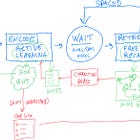
Discover more from Ger O'Sullivan's Newsletter
Uncovering GPTs; just a prompt wizard for ChatGPT?
Delving deeper into OpenAI's newest no-code tool "GPTs".
OpenAI's recent DevDay brought a significant announcement: the introduction of custom GPTs. ChatGPT Plus users can now create their own bespoke GPT chatbots, accessible to other Plus members.
Initially, I viewed GPTs with some skepticism, seeing them as merely a ChatGPT prompt wizard interface—a more refined UI than standard GPT-4, equipped with predefined prompts.
However, after spending more time exploring these GPTs, my perspective has shifted. The transformative potential of a user-friendly interface is substantial, especially in creating bots for non-technical users and broadening their use.
The OpenAI documentation is still evolving, so I find it useful to share what I’ve learned from creating my own GPTs.
Study recall coach
The most ambitious GPT I've developed is the Study Recall Coach. It's based on the evidence-backed Free Recall study technique, where students recall as much as they can about a topic on a blank sheet of paper, ideally in a mind map format. I've previously written about this practice in this article:
With GPTs' access to image upload and web browsing, I developed a version that can:
Ingest a topic via file upload or web link.
Upload, read, and understand students' hand-drawn recall notes, even in mind map format!
Conduct an error correction phase with feedback and generate a gap list.
Recommend the next revision date based on performance and spaced repetition best practices.
Here's an example where I posted a link to a basic heart anatomy article and uploaded my FreeForm mind map doodle to the Study Recall Coach GPT:
I was impressed with its analysis of my poorly drawn heart and challenging handwriting.
This tool could be highly beneficial for students, aiding in more effective study sessions. Currently, it's limited to those with a ChatGPT Pro account.
If you have a Pro account, you can try my Study Recall Coach GPT.
Efficient Learner GPT
This simpler GPT was trained on my articles about scientifically backed study techniques. I uploaded the documents as a knowledge source, provided a simple prompt, and the app worked on the first attempt:
If you have a ChatGPT Pro account, you can try Efficient Learning GPT.
Choose Your Adventure
Inspired by one of my favorite childhood book experiences, the Choose Your Own Adventure series, this GPT lets you steer the story's path based on decisions made at key points.
I requested illustrations to accompany the text, aiming for a retro 1970s to 1980s science fiction aesthetic. The results were mixed, with either no images generated or a more modern, futuristic 3D style, as seen above.
If you have a ChatGPT Pro account, you can try Choose Your Adventure GPT.
Summary
In my experience with the new GPTs UI, I found it intuitive, yet I preferred bypassing the instruction wizard in favour of directly using the 'Configure' option for more streamlined control. While the UI is helpful for non-technical users, I believe that more serious AI applications will likely utilise the OpenAI API directly, developing their own apps on their own domains for enhanced control over conversations and external integrations. Also, there were instances where the bots behaved unpredictably, indicating that until OpenAI addresses these issues, GPTs may not be widely adopted for serious use.










